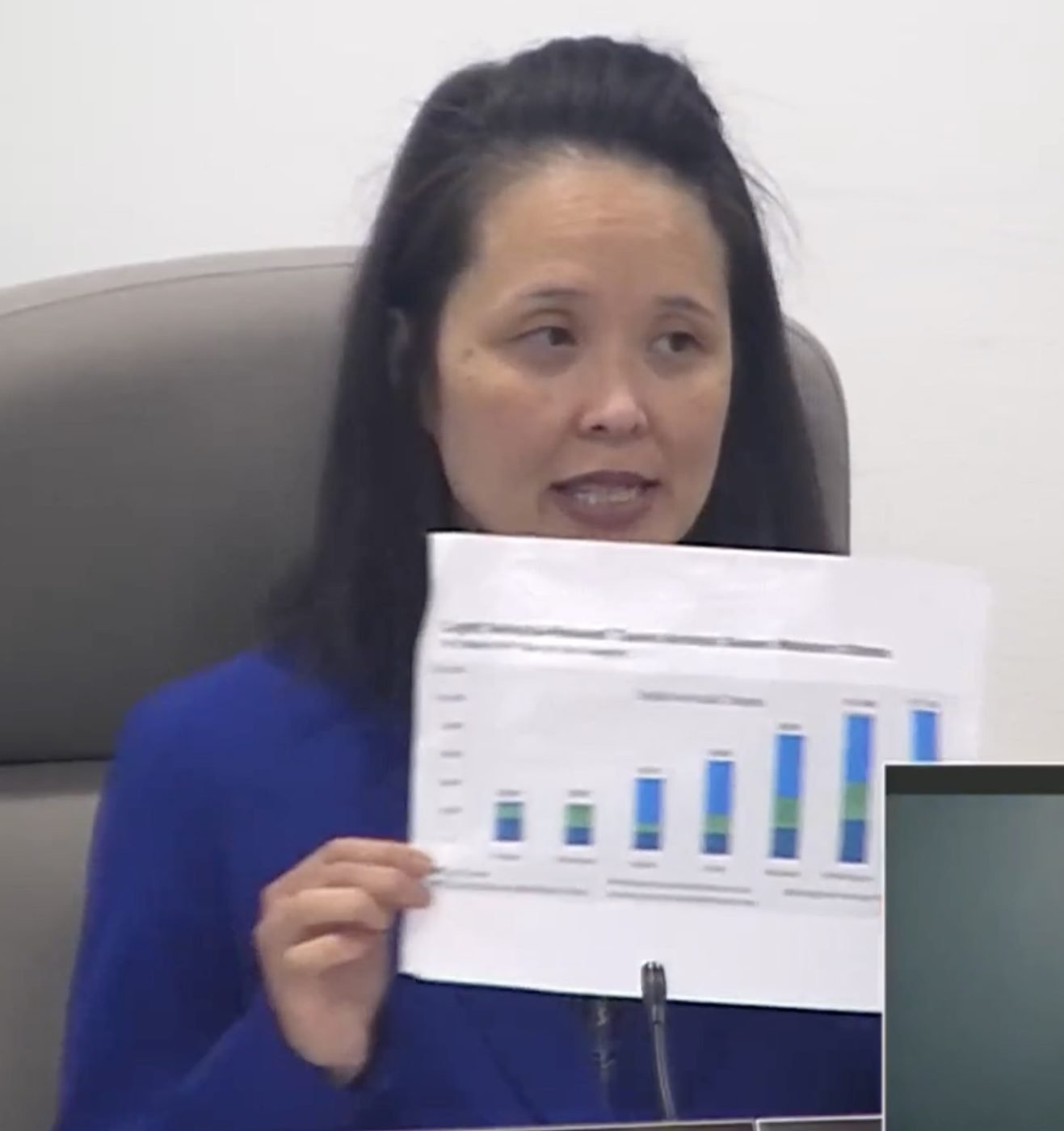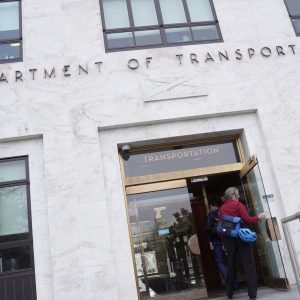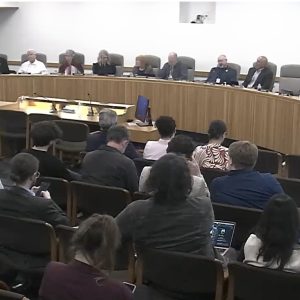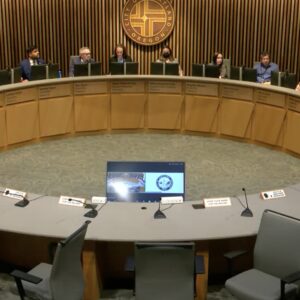House Bill 2025 has passed out of committee for the final time and will get a vote on the House floor Friday. The $11.6 billion package of transportation funding underwent considerable changes since it passed out of the Joint Committee on Transportation Reinvestment last week. Authors of the bill lowered the overall revenue of the bill by about $3 billion by reducing the gas tax provision and eliminating a new vehicle “transfer tax.”
Those changes helped persuade one Republican on the JCTR to vote in favor of the bill. In remarks at the committee meeting this afternoon, Senator Kevin Mannix said, “Where are we going to go if we don’t move forward with this legislation? The easy thing is to say, ‘Well, we’ll just sit back. I mean, I’m a Republican, I’ll just let the Democrats carry the water.’ But wait a minute, I’ve had an opportunity to participate in this process… and I know it would be easy enough to sit here and say no, but I’ve decided that I need to say yes so that we can move forward.”
The bill was voted out of committee 8-4, with “no” votes coming from Senators Bruce Starr and Suzanne Weber, as well as House Representatives Jeff Helfrich and Shelly Boshart Davis.
Starr and Davis were the most vocal opposition and framed their concerns primarily around the tax increases in the bill and what they felt was a lack of bipartisanship throughout the negotiations.

While Starr and Davis said Oregonians couldn’t afford to pay for safe routes and reliable transit, JCTR Co-Chair Senator Khanh Pham said she supports the bill because a dysfunctional and disinvested transportation is unaffordable. “One in three, or one in four Oregonians can’t afford a car, or maybe their household depends on one car and can’t afford a second car,” Pham said in her closing remarks. “They depend on reliable bus service and they can’t afford to be late. That is more expensive. That is costly when you’re late for work and you lose your job. Those, those are the the expenses that I worry about when it comes to impacts on Oregon families.”
Sen. Pham, who represents a part of southeast Portland, presided over the JCTR for the first time and was clearly thrilled to play that role. At one point during her remarks she held up a chart to counter narratives that Oregonians should not pay more for using roads. Using data from the Legislative Revenue Office, Pham pointed out that Oregonians currently pay the lowest amount in annual transportation-related taxes among all seven western states. And if HB 2025 passes, Oregon would move up to 6th.
Just hours before the meeting, Senator Mark Meek, a former member of the JCTR and Democrat who opposes the bill, posted an update on his Instagram page saying HB 2025 would impose a new tolling program on I-205. Meek’s assertion is completely false and it led to committee co-chairs and Governor Tina Kotek having to make remarks to debunk the rumor at the outset of the meeting.
From here, the bill, known formally as HB 2025-A28, will move to the House Floor for a vote on Friday. Given the recent changes to the bill and the relatively calm comments from lawmakers in committee today, I have a strong hunch the bill will have the votes it needs to pass.








Thanks for reading.
BikePortland has served this community with independent community journalism since 2005. We rely on subscriptions from readers like you to survive. Your financial support is vital in keeping this valuable resource alive and well.
Please subscribe today to strengthen and expand our work.
I don’t understand why one senator is punished for raising his voice but there is zero fallout for Meek who is blatantly lying about the legislation. If anyone should be losing committee assignments it is the guy who lacks either integrity or reading comprehension.
Meek did lose his seat on the committee – Wagner replaced him, or so I heard.
I hear your frustration on this Bjorn. I think bad faith politicians that lie to the public about such important matters need to be named and shamed, but at least they called out the behavior in general – even if they didn’t name who did it.
And I think the best punishment for folks like this is to win the policy and get stuff passed that they don’t like… which is exactly what happened.
Folks, let’s get this passed!
You can find the contact info for your rep. and senator here
https://www.oregonlegislature.gov/FindYourLegislator/districts-initial.html
The Street Trust is distributing this sample letter.
*********
Copy and paste the text below into your email. Feel free to personalize:
Subject Line:
Please pass HB 2025
Message Body:
Hello, as one of your constituents, I am writing to urge you to pass HB 2025. Its historic investments in Safe Routes to School and Great Streets programs, as well as funding for transit, will save and improve lives in our community and beyond.
These programs are lifelines, funding safe crossings, sidewalks, buses, trains and lighting that connect people to schools, jobs, transit, and community. Without this funding, too many Oregonians, especially children, seniors, and people with disabilities, will be forced to travel dangerous roads every day.
Thank you for the hard work getting the transportation package to this point while protecting funding for safe streets and transit. Now I need to ask you to ensure that the package is passed before the end of the session on Sunday. Not passing HB 2025 is a risk Oregonians can’t afford.
********
You can add in your own anecdotes, of course. About how you are not happy with the state of roads in Oregon, and you think they should take this opportunity to get it fixed.
Ted Buehler
The bill does need to pass, but it’s still a disappointment. I guess if all parties are disappointed, that’s the best we can hope for.
Ted,
Doesn’t this bill funnel 100’s of millions into severely damaging and dangerous projects such as the RQ which will add 2-lane on- and off-ramps with large radii intersections and the Columbia river bridge which will be very destructive for the lands a couple of miles on either side of the bridge, not to mention this is setting ODOT up to widen the highway through North Portland neighborhoods and south of the Rose Quarter. IMO, this trade-off is not worth it. I would rather miss out on the safe routes and great streets money than endorse the highway money. I am so disappointed with Oregon Democrats
don’t take my word for it:
https://cityobservatory.org/why-oregons-legislators-should-vote-no-on-hb-2025/
Hi MaxD,
Well, in a perfect world we might get something as good as the City Observatory proposes. Unfortunately, that isn’t an option at this time.
In our world, it looks like we’re stuck between 2025 or 3402, which turns the Oregon Department of Transportation back into the Oregon Department of Highways.
I’m glad I emailed my rep and senator last night with support for 2025. And visited them on Transportation Safety Day at the capitol in late April.
Ted Buehler
Could you say more about “destroying lands on either side of the [CRC]”?
Everything seems to be either already developed or wetlands/wildlife areas. To the best of my knowledge, which is imperfect, those wouldn’t be impacted.
Is it possible to construct a wider road through a wetland or wildlife area, knowing how much disturbance and soil compaction comes with that, with the ultimate goal of moving more motor vehicles through the area, and pretend the area “… wouldn’t be impacted”? Have you ever looked at the construction site of a thing that has been built but not landscaped? Most urban landscapes are a thin layer of green on top of deeply disturbed soil.
Freeways have a base that is much wider than the road surface we can see from our vehicles. If the road is wider, the base is wider by at least the same amount, and the area that is turned over by construction equipment is wider still. The things constructed impede natural water movement in wetlands. It is impossible to build a modern road in what is called a wetland without drastic change.
Maybe Paul H would say that there’s already a road, so the adjacent land is degraded, why not build more? I would say that’s the entry point for building a road in any place and everyplace. If the adjacent land has low value, it is because of the road, but more pavement won’t cause more harm? Where do you stop?
I’m saying that construction would not be allowed to impact wetlands.
Therefore the larger footprint would go where everything is already paved. Does that make sense?
The increase height of the bridge and the huge on and off ramps will negatively impact physical and visual connections to downtown Vancouver and bring significant increased noise and chemical pollution (pollution from car tires is top threat to Salmon). The miles of reconstructed and widened freeway will decrease the value an livability of all land adjacent to it, whether that land is wetland, a neighborhood, a park, or a commercial property. The external costs of expanding a freeway to this size and height is tremendous and should not be discounted.
Thanks for clarifying. We pretty much already have 6-ppdq figures out, so new roadways should be able to mitigate that.
Agree that everything you describe is a major impact, but not what I thought of when you said “destroy the land”.
Fred and MaxD,
Yes, good points, of course.
But. I suspect ODOT will find the funds to build the New Interstate Bridge and the Rose Quarter widening projects regardless.
A reliable source of funding for transit, bicycling, walking and safety is much harder to nail down.
My reasoning. FWIW.
Ted Buehler
Thanks Ted! I appreciate your pragmatism and your optimism, but in the my opinion the freeway expansions are an existential threat.
It’s peak carbrain to bemoan the raising of taxes to pay for mass and active transportation infrastructure and services that can actually be used as a practical matter while simultaneously ignoring how big a money pit personal automobiles are for both individuals and governments!
That’s a thought distilled from my viewing of the live testimony last night and some discussion (I had to run errands part way through the hearing), not a response to anything in particular in Jonathan’s article. It’s just super frustrating to constantly beat back the people complaining about how expensive taxes and fees are by pointing out how expensive their automobile-only plans are.
At about $10 per ride (TriMet’s operation costs, not including WES, which is closer to $100), TriMet is no bargain either. That’s on top of maintaining the road network TriMet buses rely on. And, come to think of it, so do bikes. And the trucks that bring our food and the other goods we rely on. And emergency vehicles.
So I think we’re going to be stuck maintaining our road network one way or the other, since we all, drivers, transit users, and cyclists, rely on it for almost everything. That said, I would be more than happy to scale back the big projects until we can find a better way to pay for them.
Seems like a willfully obtuse take. Getting, say, twenty motorists to switch from their individual automobiles to a single bus would do several things to make the cost of mass transit cheaper. The most obvious thing is that the overhead costs per rider trend downward as ridership increases; it’s more efficient to run a full bus for more of the time than an empty, sparsely ridden bus.
On the road network side of things, the fewer vehicle miles traveled per vehicle weight, the less damage is incurred and the less maintenance will be required and the longer the lifespan of those roads. Buses will cause exponentially more damage than a Honda Civic, for sure, given that buses are much heavier than a compact sedan, but those buses are generally running anyway with the marginal passenger weight being fairly negligible, so getting the marginal car off the road will be a net benefit to highway O&M. Buses also aren’t going to be traveling on every single road, so the maintenance costs of the non-arterial roads that the buses will be traveling will certainly nosedive if you cut down on VMT.
And in an effort to actively fight against carbrain, we can also reimagine how a transportation network might look if the private automobile is no longer assumed to belong to every adult and given primacy on the streets. Perhaps not every neighborhood street needs to be capable of handling two-way automobile traffic (this is already the case on many narrow residential Portland streets with on-street parking), and can be made narrower, which is cheaper to both build and maintain. Perhaps some streets can be made completely car-free, which would be even cheaper. Perhaps some lots don’t need frontage to a street capable of hosting a private automobile. Imagine a city where your house or apartment opens up onto a 12-foot wide street open only to pedestrians and cyclists and small emergency services vehicles! That certainly seems a lot cheaper to me while still maintaining a complete network that I can walk and ride on! And cleaner, safer, and more peaceful, too!
Automobiles are incredibly useful tools, and they certainly have their legitimate use cases and places in the city. But it’s wrong to extend that fact to the idea that absolutely everyone must have the opportunity to own and operate an automobile at maximum convenience to them, and so it is wrong to start with the carbrained assumption that big, wide, expensive, dangerous streets must worm their way into every little corner of the city.
Kind of like the chicken and egg . . . .
What comes first, riders on TriMet, or TriMet making the buses and choo choos safer and more reliable?
I work downtown, and my employer pays for parking downtown because there was a “revolt” and employees spoke loudly, that they were not riding TriMet until they cleaned up the system. I and a handful of others still ride.
“Getting, say, twenty motorists to switch from their individual automobiles to a single bus”
And how, exactly, do you do that? Buses are inherently slow (usually slower than riding a bike even). They are at times unpleasant, and occasionally dangerous. They are more expensive than driving if you have a car. Carrying stuff on a bus ranges from inconvenient to difficult. Portland buses are coated with trace amounts of dangerous drugs.
How do you convince people to switch? You don’t need to convince me that from a societal perspective buses are a great solution; you need to convince those 20 individuals that they be better off taking the bus to work, to do their shopping, to take a date out to dinner, etc.
You can dream all you like about rebuilding our residential street network to be 12ft wide with a huge pile of money that comes from… somewhere (the Trump government? The Oregon legislature? Defunding the police?). But the real trick is convincing people to take the bus. Because the truth is that most people absolutely do not want to do that.
You can’t have it both ways. You’ve pointed out, various times, that transit ridership is expensive because the systemwide cost divided by passenger miles is so much, say it’s ten dollars or whatever. At the same time you base your car use decisions on marginal cost alone. You bought the car in time past so it works for you personally to ignore that cost.
The marginal cost to society of an additional bus rider is almost nothing because there is excess capacity. We need something like a bus because so many people can not drive a private motor vehicle even if they have the money required. The value of transit service to the individual rider who is otherwise home bound is huge. It can be life saving.
See: ‘Stop Requested’, a radio series available on OPB about rural transit in Oregon, and ‘When Driving Is Not an Option: Steering Away from Car Dependency’ by Anna Zivarts.
Looks like the fireworks come early this year with this bill going to the floor at the last minute.
While I have my disappointments with the bill, I am still hoping it passes. We need to keep funding our transportation system since it’s just going to keep getting more expensive as it falls into disrepair.
I really wish they kept the indexing of the gas tax to inflation. Without this, everyone will be back to the table in 2033 to discuss how to get more funding for operations and maintenance when the gas tax doesn’t keep pace with the costs to improve our transportation system.
I’m also irritated they removed the Road Usage Charge being required for ICE vehicles at a later date. Now just EVs and Hybrids are required to be on the OreGo system (and may be subject to additional Federal fees with talks within the current administration). We should be continuing to incentivize the move to electric and more climate-friendly vehicles, not making ICE vehicles the easier option. When it comes to maintaining or improving the transportation system, the person driving a Nissan Leaf should not pay more in taxes and fees than the person driving the Ford F-250.
If this bill crashes and burns, I will celebrate. Pretty much the only meaninfgul decarbonization we get in Oregon is when the legislature fails to fund more highways…
Comment for Jonathan’s sake: It looks like the bill is dead.
Oregon Democrats’ major transportation bill is dead, sources say – OPB
thanks just posted a piggyback of that story with some of my thoughts. https://bikeportland.org/2025/06/27/opb-reports-that-the-big-transportation-bill-is-dead-395132